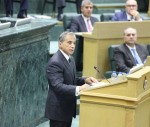You are here
Despite another lethal Daesh strike, ‘Ankara still believes Kurds are more dangerous’
Jan 04,2017 - Last updated at Jan 04,2017
The Daesh-claimed attack on the upmarket nightclub in Istanbul must be counted as a “blowback” to policies adopted by Turkish President Recep Tayyip Erdogan.
Having been ready to use takfiris as tools to advance his policies, his government is now regarded as “apostate” and an enemy of the takfiri cause.
At domestic level, Ergodan’s Justice and Development Party (AKP) the Turkish equivalent of the Muslim Brotherhood, has promoted the rise of conservative fundamentalists throughout the country.
Friday mosque sermons have castigated secularism and the adoption of Westernised behaviour and Western holidays like Christmas and New Year.
A sermon promulgated by the government’s Directorate of Religious Affairs castigated New Year’s celebrations as alien to Turkey, belonging to “other cultures and other worlds”, and urged the faithful not to take part in ceremonies that “don’t reflect our values”.
Encouraged by this official anti-foreign attitude, Daesh threatened to strike at such celebrations ahead of New Year’s eve.
An attack on the high-profile Reina nightclub should have been anticipated and security tightened.
One young policeman at the door was hardly a deterrent or protection.
Turkey was established by Mustafa Kemal Ataturk nearly a century ago as a laic or strongly secular state, modelled on France.
Erdogan’s drive to transform Turkey into a conservative Muslim polity, referencing the Ottoman Empire, has appealed to devout Turks who never liked secularism and voted for the AKP.
This policy has, however, involved granting hospitality to radical Daesh takfiris who were allowed to establish not-so-covert cells in Turkey’s cities, towns and villages and who seek to impose their ideology, social mores and cultural norms on the country.
Turkey is hardly an exception.
Radicals have risen in similar fashion in other countries where religion has been politicised.
Indian politicians have exploited Hindusim, Burmese hardcore Buddhism, and Latin American countries Catholicism. (Assaults on young women attending New Year street parties in Bangalore, India’s IT capital, were excused by a state minister by saying the women were to blame because they were behaving “like Westerners”. Hindu fanatics are particularly opposed to sweethearts exchanging greetings on St Valentine’s day.)
At domestic level, Ergodan has also used anti-Kurdish feeling and Turkish nationalism to maintain his party’s hold on parliament, although he pledged to put an end to Turkish-Kurdish ethnic strife when he became prime minister in 2003.
He approached the Kurdish problem by saying Islam could unite the two peoples. This was, of course, contrary to Ataturk’s view that political geography citizenship in the modern Turkish state should unite Turks and Kurds.
Ataturk and his secular successors dubbed Kurds “mountain Turks” and attempted to suppress their language and culture.
The Kurds did not buy into either policy and have been fighting Ankara for 30 years. However, in 2013, Erdogan did manage to negotiate a ceasefire with the Kurds in the expectation that a peace deal giving them cultural and political rights could be reached.
This did not happen, and in 2014, Erdogan resumed bombing northern Iraq bases of the Turkish Kurdish Workers’ Party (PKK), the main Kurdish opposition group.
The PKK responded by attacking Turkish police and army posts, prompting Erdogan to declare war on the PKK and to order the army to conduct air and ground operations against the Kurds in Turkey’s southeast, laying waste to towns and villages.
This was a political as well as a military decision.
In the June 2015 parliamentary elections, Ergodan’s AKP failed to secure the expected majority. This was particularly irksome for Erdogan because some of the seats the AKP lost went to the pro-Kurdish People’s Democratic Party.
The result was a hung parliament because opposition parties refused to enter into a coalition with the AKP.
Erdogan called a November snap election, galvanised nationalistic and anti-Kurdish Turks, and restored his parliamentary majority.
In retaliation, there have been at least nine attacks in Turkey by the Kurdish Freedom Falcons, an extremist offshoot of the PKK.
The third deadly and devastating decision adopted by Erdogan was to try to overthrow Syrian President Bashar Assad.
He began implementing this policy in July-August 2011 by forming the “Free Syrian Army” as a tool to oust Assad by force, and the expatriate, Brotherhood-dominated opposition Syrian National Council as a vehicle for taking power in Syria.
Both failed to realise Erdogan’s expectations. Nevertheless, fighters, funds and arms have been transferred through Turkey to insurgents and to Al Qaeda offshoots Jabhat Al Nusra (rebranded as Jabhat Fatah Al Sham) and Daesh, enabling the two rival takfiri organisations to become the most powerful armed insurgent factions in Syria.
Following Daesh’s capture of the Iraqi city of Mosul in June 2014, Turkey’s ally, the US, belatedly formed a coalition to wage air strikes against Daesh in Iraq.
Turkey joined that October, but used the coalition as cover for its bombing missions against the PKK.
In July 2015, the US secured Ankara’s agreement to use the NATO airbase at Incirlik to attack Daesh in Iraq.
Erdogan’s animus against the US grew due to its support for the Syrian Kurdish People’s Protection Units during the battle against Daesh for the Syrian border town of Kobane in early 2015.
Erdogan fears that Syrian and Turkish Kurds will join forces against Ankara.
Turkey’s recent opportunistic alignment with Russia and Iran to impose a ceasefire in Syria and sponsor negotiations between the Syrian government and opposition could lead Daesh to step up attacks on sensitive and vulnerable Turkish targets.
The last thing Daesh wants is an end to hostilities between Damascus and the range of non-Al Qaeda insurgent factions.
In spite of at least seven deadly Daesh bombings in Turkey since June 2015, Erdogan continues to insist Turkish and Syrian Kurds are a greater danger to Turkey than Daesh and argues that Jabhat Fatah Al Sham is not a “terrorist” organisation despite its record of suicide and car bombings.
He ignores its attachment to Al Qaeda, which hopes to become the world’s most dangerous takfiri group if and when Daesh is suppressed or eliminated in Syria and Iraq.













